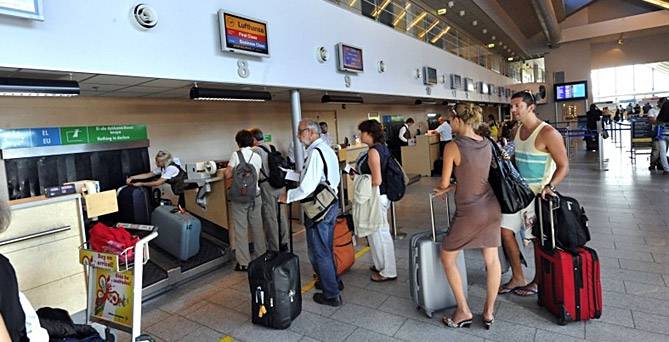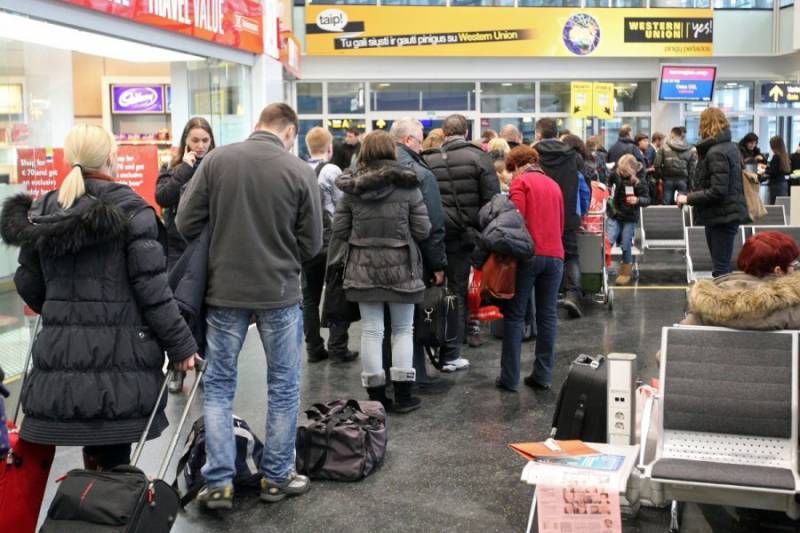"Everyone went to London." Where and why emigrate from the Baltic?
That unemployment was one of the reasons for the mass outflow of citizens to Europe. Another reason is the low level of wages combined with high prices for goods and services. Therefore, for many Latvians, Lithuanians or Estonians, it is easier to work in London or Dublin as waiters, construction workers or sellers than to work in more prestigious positions in their home countries for less money.
The level of outflow of population from small Baltic countries is really impressive. So, from Lithuania only in one 2014 year 36,6 emigrated thousands of people, in 2013 year - 38,8 thousand people, in 2012 year - 41,1 thousand people. In the first decade of the 21st century alone, the population of Lithuania declined by almost half a million people - from 3,484 million in 2001 to 3 million in 2011. The rate of emigration from neighboring Latvia is not much different either. So, by 2015, 10% of the population left the country. In just one 2010 year, over 40 thousands of people left Latvia. Almost all of them are sent to work in the countries of Western Europe. Emigration from the Baltic countries became especially active after their entry into the European Union. This step has opened wider opportunities for the employment of Baltic immigrants in the countries of Western Europe. Naturally, many have used it. First of all, young people are leaving, who do not see any special prospects for themselves in their homeland. When the Institute of Philosophy and Sociology of the University of Latvia conducted a sociological study trying to find out the motivations of emigrants, over 70% of respondents answered that in Latvia there is no opportunity to find a well-paid job, and social support from the state. Over 30% of interviewed Latvian immigrants are confident that they will never return to their homeland, only 16% of respondents are ready to come home in a few years.
One of the most impressive Baltic diasporas settled in the UK. At least the fact that in 2013, 10% of all newborns of Latvians were born in the UK can testify to the scale of the Latvian emigration to the UK. And this is not surprising, given that mainly young people go to the UK. Even in the service sector in the UK, you can get good money by Latvian standards, while in your home country it’s difficult to just find a job. For the sake of money and more or less tolerable life, Latvians are ready to live in a foreign land, where, in general, the attitude towards them is about the same as the Russians in Latvia itself. After the majority of Britons voted to leave the European Union, attitudes towards immigrants from Eastern Europe, including the Baltic states, in the UK seriously deteriorated. It is known about the attacks on Polish citizens working in the UK. No less negative part of the British society is configured in relation to the Baltic migrants. The British are convinced that Latvian immigrants rob them of their jobs, agreeing to work for less money than the British.
The Lithuanian diaspora of Great Britain is also very numerous. Lithuanian citizens leave their country for the same reasons as Latvians - low wages, high unemployment, inability to realize themselves. Many of them are traditionally sent to the UK, where they take jobs in undervalued and underpaid professions according to British standards. But for Lithuania, the salaries of British sellers and waiters are fabulous money. Only in recent years 3,5% of able-bodied Lithuanian citizens emigrated to the UK. In the Lithuanian embassy in London, the number of compatriots in the UK is estimated at about 200 thousand people. This is a very impressive figure in relation to the total population of Lithuania - 2,9 million. It turns out that almost every tenth Lithuanian is in the UK. It is worth noting that Lithuanian families in the UK have a low birth rate, in contrast to immigrant families from African and Asian countries. Most of the visitors do not want to return to Lithuania either, although the attitude of the British to them is not very good.
So, in July 2016, the Lithuanian Ambassador to the UK Aste Skaysgirit, reported ten known cases of attacks on Lithuanian citizens on an ethnic basis. Lithuanian Foreign Minister Linas Linkyavicius even sent a special letter calling for the prevention of manifestations of British nationalism against Lithuanian citizens. On the other hand, British police report that many Lithuanian citizens arriving in the UK are on the path of criminal activity, committing crimes and offenses, which indicates their unwillingness to integrate into British society and earn their living by honest labor. However, in fairness, one can hardly compare the crime rate among Latvians or Lithuanians and, say, among immigrants from the countries of the Middle East, North Africa and South Asia.
An impressive Latvian diaspora lives in Ireland. The number of Latvian migrants in this country is estimated at about 20-25 thousand people. As in the UK, in Ireland the majority of Latvian migrants are employed in the service sector and hard physical labor. The problems with the local residents are due to the fact that when arriving in Ireland for permanent residence, Latvian immigrants do not at all strive to learn Irish - they are sure that they have enough more or less tolerable knowledge of “everyday English” in order to communicate with the Irish. It is clear that the Irish patriots do not like this state of affairs, but on the other hand, and among the Irish themselves, not everyone speaks their native language.

Lithuanians also travel to Ireland. For immigrants from Lithuania, this country is one of the main objectives of migration, along with the UK. However, recently there has been a decrease in the number of vacancies in the UK and in Ireland, which affects the level of labor migration. For example, from Ireland, many Lithuanian immigrants began to move to Norway. A very popular migration destination is Spain, where Lithuanian immigrants work in the service sector and in the tourism business. But Lithuanian immigrants living in the countries of Western Europe do not want to return home, because there it is very difficult to find a job, and even if you work for it, it’s far from a fact that you can secure decent living conditions for yourself.
As for the main directions of Estonian migration, Estonians prefer, for reasons of linguistic and cultural proximity, to migrate to Finland. Neighboring Finland is a very attractive target for Estonian migrants, especially since the Finnish government has always emphasized the policy of supporting Finno-Ugric peoples all over the world. For Estonian workers in Finland there are many vacancies, and the developed system of social protection of the population is very attractive for people from a country that is in a state of permanent crisis. In addition to Finland, many Estonians emigrate to the UK, although on average the level of Estonian emigration to the UK is lower than the level of Latvian or Lithuanian emigration. Many Estonians leave for Russia and Germany, and to a lesser extent for Ireland and the United States of America.
The mass emigration of the population, with the youngest, most active and able-bodied, has become the most serious demographic problem of the modern Baltic. How to solve it, the Latvian, Lithuanian and Estonian governments do not know. The Baltic states have no financial resources to ensure jobs and a decent standard of living for their citizens. Entry into the European Union has removed the previously existing barriers to labor migration and now Latvians, Lithuanians and Estonians are quietly migrating to other, more economically developed countries of the European Union.
Meanwhile, the European leadership has already started talking about the fact that in the Baltic States should be placed "refugees" from Africa and the Middle East. Eastern European countries, including, above all, Hungary and Slovakia, actively protest against the quota policy imposed by the leadership of the European Union. For the Baltic states, which are completely dependent on assistance from the United States and the European Union, there is no room for maneuver. Although, of course, no one in Latvia, Estonia and Lithuania would like to see a massive influx of African-Asian migrants. For twenty-five years, the Baltic countries have pursued an active policy of discrimination against the Russian and Russian-speaking population, seeking to survive the representatives of all the non-Baltic ethnic groups.
In Latvia, Russian-speaking people still often do not even have the citizenship of a country, being content with the degrading status of non-citizens. The situation in Estonia and Lithuania is not much different. More recently, the Russian-speaking in the Baltic countries were regarded as allegedly "occupiers." But now the Baltic republics cannot abandon the "refugees" - Afro-Asian immigrants completely alien to the cultural, ethnic, linguistic, confessional relations. Moreover, the Baltic countries can hardly provide these migrants with work, the Baltic officials lack experience of communicating with people of a completely different culture (and the Eritreans, Somalis or Libyans are not Russian-speaking former citizens of the USSR).
The leadership of the European Union does not leave behind Vilnius, Riga and Tallinn the choice - it will be necessary to accept Somali and Eritrean “refugees”. In Latvia, the first “refugees” arrived in February 2016 of the year. As a rule, “refugees”, originally located in Italy, Greece and Turkey, are shipped to the Baltic States. Basically, they come from Syria, Iraq, Eritrea, Somalia. So far, the number of Afro-Asian migrants who have arrived in the Baltic countries is still very small, but in the future it can seriously increase, which, of course, will be facilitated by the relevant EU policy. Lithuanian Parliament Speaker Loreta Grauzhinene tried to explain that the quotas proposed by the European Union for accommodating “refugees” are completely unacceptable for the Baltic states, but the EU leadership remains adamant. For example, for Vilnius, a quota was defined in 710 people, and Lithuania should accept 217 people without fail. The numbers, of course, are not very impressive, but it is possible that the European Union will not stop there.

Estonian Prime Minister Taavi Rõivasa also tried to argue that his country could not accept a large number of Afro-Asian immigrants. Estonia is considered a very unfriendly country towards immigrants. Therefore, the Prime Minister even went to the "military trick" - he said that a large number of Russians who settled here after World War II live in Estonia, and Tallinn supposedly solves their social and economic problems. But, of course, the European Union did not accept such a dubious argument of the Estonian side, and quotas for receiving “refugees” were assigned to Tallinn anyway.
The situation is similar in Latvia. As soon as it became known in 2015 that the European Union was going to send “refugees” from Eritrea to Latvia, the mayor of Riga, Nil Ushakov, said that there were no places in the city to accommodate them. On the other hand, many Latvian politicians are convinced that Latvia, like other Baltic countries, due to the level of economic development will not be considered “refugees” as the ultimate goal. Most likely, the majority of African-Asian migrants in the near future will prefer to leave Latvia, Lithuania and Estonia and move to more prosperous and socio-economically developed European countries. This is quite understandable, especially considering that even the natives in the Baltic countries do not want to live and work, who prefer to look for their place in life in the UK, Finland, Ireland, Germany, Sweden - anywhere, but not in their homeland.
No less than the possible appearance of Africans on the Baltic coast, Latvia and Lithuania are worried today news from the UK. The course of London to exit from the European Union put the Baltic states in a deadlock. Following the withdrawal from the European Union, Great Britain, of course, will get rid of “guest workers” from Eastern European countries, including many Latvian and Lithuanian employees.
Returning back tens of thousands of young and able-bodied people who, over the years of working in the UK, have become accustomed to living at a higher level, can become a very serious sociopolitical problem for the Baltic states. Can the modern governments of Latvia, Lithuania and (to a lesser extent) Estonia solve it? Most likely no. Unlike Poland, in the Baltic states there is practically no real potential for improving the economic situation. A quarter of a century the post-Soviet Baltic states diligently destroyed the remnants of the Soviet economic infrastructure, consciously turning themselves into colonies of the West. Now there are simply no jobs for returning compatriots, so the mass return of yesterday's “guest workers” in itself will threaten the social and political stability of the Baltic states with very serious consequences.

Information